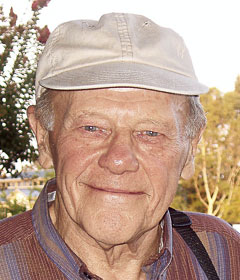Kadison to Give 2007 Porcelli Lectures
The Pythagorean Theorem from another, slightly sophisticated, point of view
The Porcelli Lectures this year will be delivered by Richard V. Kadison, Kuemmerle Professor of Mathematics, at the University of Pennsylvania. His talks will center around operator algebras and the Pythagorean Theorem from another, slightly sophisticated, point of view.
Lectures
- The Pythagorean Theorem: A Closer Look
- Tuesday, April 10, 2007, 3:40–4:30
- Operator Algebras: A Sampler
- Wednesday, April 11, 2007, 3:40–4:30
- The Pythagorean Theorem: An Advanced View
- Thursday, April 12, 2007, 3:40–4:30
All three lectures will take place in 130 Howe-Russell Geoscience Complex. Refreshments will be served in the Atrium in the Howe-Russell Geoscience Complex from 3:00 to 3:40.
Abstract
Extensions and variants of the Pythagorean Theorem are presented, first from the point of view of finite-dimensional, linear algebra and, later, in the framework of infinite-dimensional Hilbert space. The results discussed make contact with the work of Kostant, Atiyah, and Guillemin-Sternberg in the convex geometry of symmetric spaces, the work of Horn and Schur on spectral theory, matrix inequalities, majorization, and convex polytopes, and semi-commutative, metric geometry from the point of view of conditional expectations. The first of the two Pythagoras lectures will be relatively elementary, the second will be slightly more advanced, relying somewhat on the operator-algebra, survey lecture that follows the first lecture.

Richard V. Kadison, Kuemmerle Professor of Mathematics at the University of Pennsylvania, is a world leader in the field of operator algebras, the theory that provides the mathematical basics for quantum mechanics. He has written and coauthored several books on the subject and around 100 articles. He is a member of the National Academy of Sciences since 1996, a foreign member of the Danish Royal and the Norwegian Academies of Science and Letters, and the recipient of numerous awards including Guggenheim and Sloan Fellowships and a Fulbright research Fellowship. In 1999 he received the Steele Prize for Lifetime Achievement from the American Mathematical Society.
| Attachment | Size |
|---|---|
| 2.05 MB |